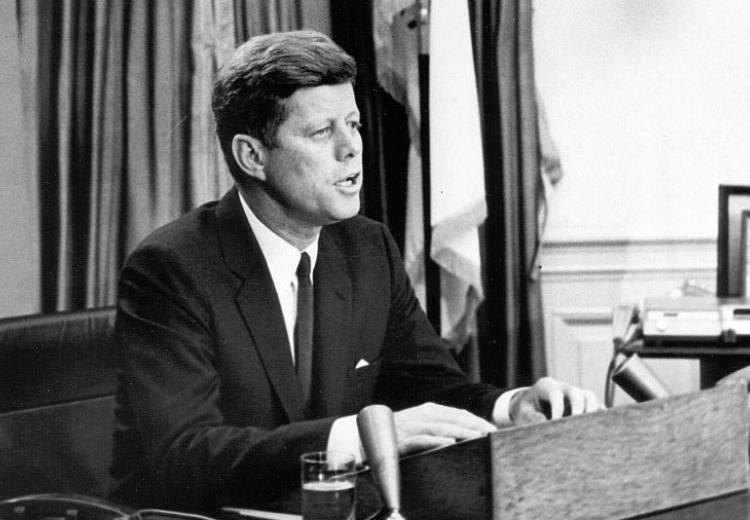Equal Opportunity

United States President John F. Kennedy addresses the nation on civil rights via television, speaking from the Resolute desk in the Oval Office of the White House, Washington D.C.
JFK, LBJ, and the Fight for Equal Opportunity in the 1960s
Activity 1 - President Kennedy and Civil Rights
To begin, go to the following: Kennedy's Radio and Television Report to the American People on Civil Rights. Click "Listen to this speech" and follow the instructions for downloading and playing the audio file in the new window that opens.
Before listening and reading to the speech, print out the following t-chart. As you listen to and read the speech, complete this chart by taking notes indicating the "Problems Described" and the "Solutions Proposed" by Kennedy.
- President Kennedy's Radio and Television Report to the American People on Civil Rights, Jun 11, 1963
Debating Kennedy's Speech
In groups (as instructed by your teacher), use the t-chart that you completed in the previous step to prepare for a class debate in which you address this question: Considering the speech, was President Kennedy's proposal a realistic and useful one? As you prepare, discuss the following questions as well as the larger question.
- How would you describe the way Kennedy presents his call for equality in public places to the American people? Was it a good strategy? Why or why not?
- Why did Kennedy state every American ought to have the right to be treated as he would wish to be treated, as one would wish his children to be treated? Do you agree with this statement? Why or why not?
- Why did Griffith expect problems with the opening of the film? What steps did he take to counter the anticipated criticism?
- Why does Kennedy state that changes must be made though the legal system and on the streets?
- How does Kennedy plan to enable the federal government to correct the racial injustices in public places?
Activity 2 - President Johnson's War on Poverty and Race Relations
- Read Johnson's Great Society Speech at the University of Michigan on May 22, 1964. As you read, outline in your own words President Johnson’s goals and the ways in which he planned on achieving those goals.
- Visit the following two web pages, at which you will listen to and read the words of Lyndon Johnson from two recorded telephone calls. At each page, follow the instructions in the slide show for listening to the audio. After listening to and reading these recordings, answer the questions below.
- Johnson Compares the War on Poverty to Abolition of Slavery
- The War on Poverty and Racial Tension in the Urban North
- Do these recordings support Johnson's goals for the Great Society?
- Why did Johnson compare the War on Poverty to the abolition of slavery?
- Describe evidence of racial tension discussed in these recordings.
- Why did Johnson talk about a need for Republican support?
- Explain the goals of his measures.
